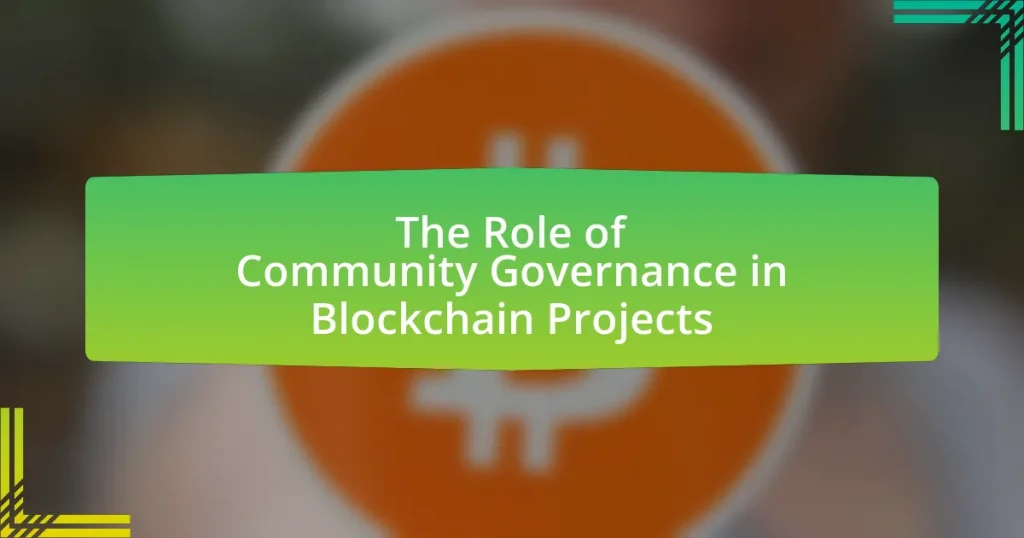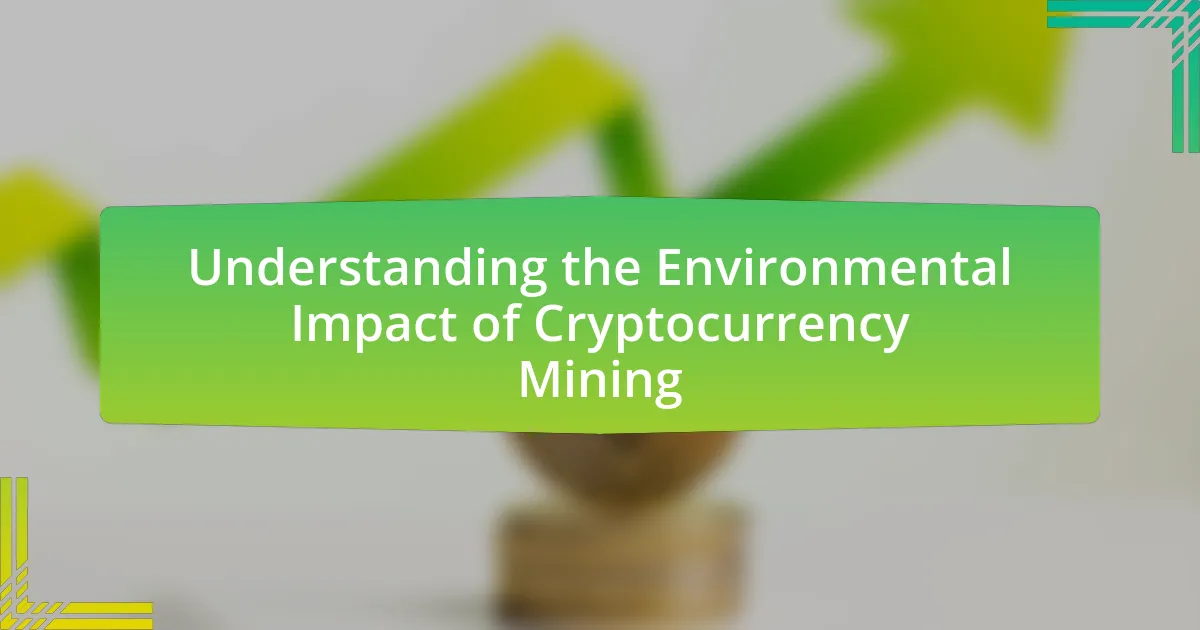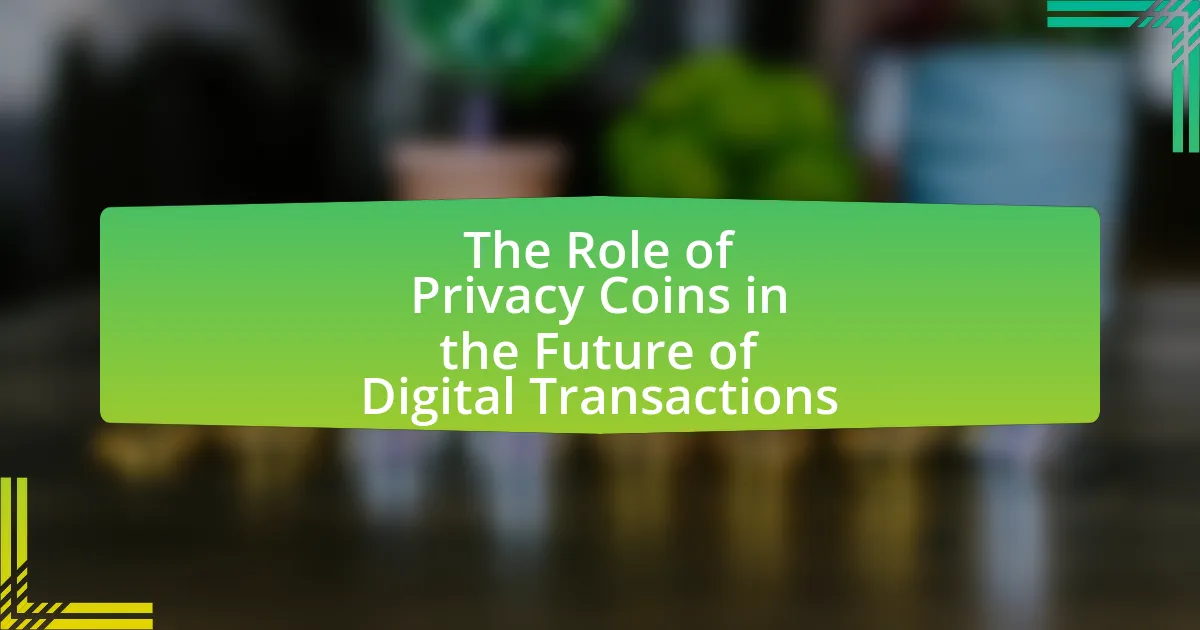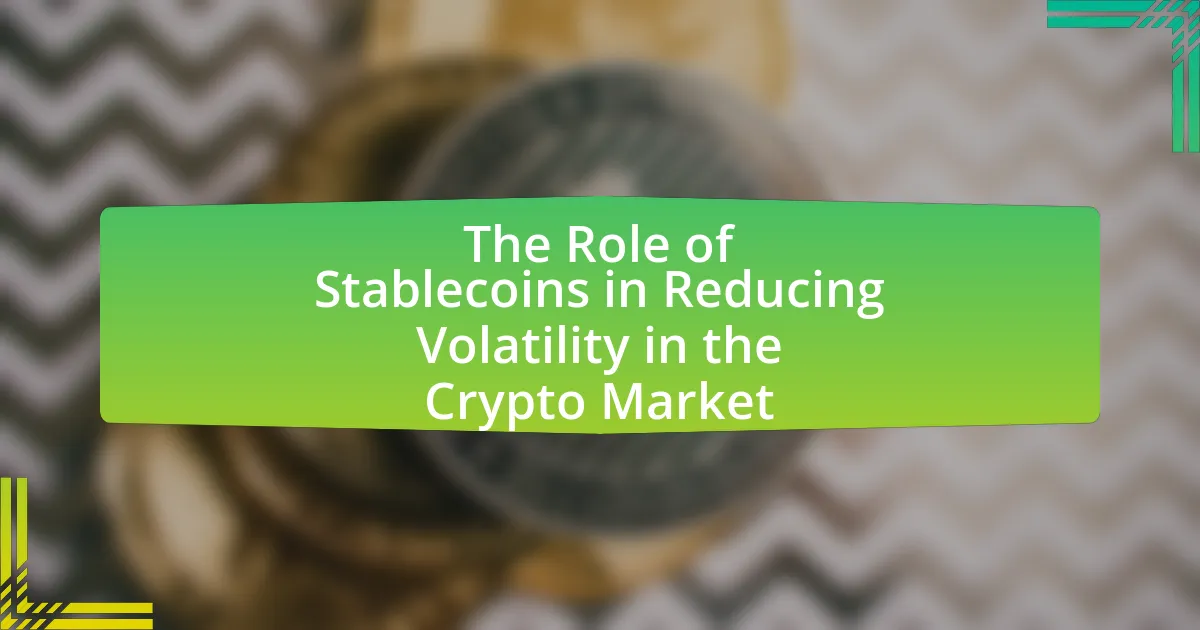Community governance plays a crucial role in blockchain projects by empowering stakeholders to participate in decision-making processes, thereby fostering transparency and trust. This article explores how community governance functions within blockchain ecosystems, highlighting key principles such as decentralization, inclusivity, and consensus. It examines various governance models, including on-chain and off-chain governance, and discusses the importance of community governance for project sustainability and user engagement. Additionally, the article addresses the advantages and challenges of decentralized autonomous organizations (DAOs) and the impact of tokenomics on governance participation. Finally, it outlines strategies for improving community governance and mitigating risks associated with governance centralization.
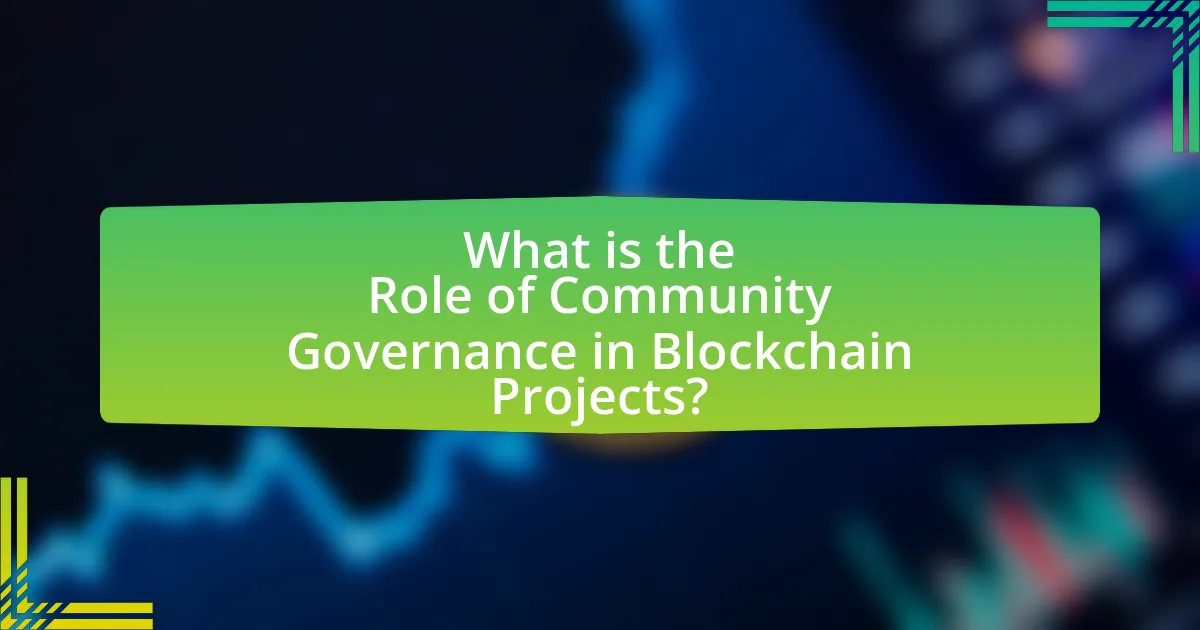
What is the Role of Community Governance in Blockchain Projects?
Community governance in blockchain projects serves to empower stakeholders by allowing them to participate in decision-making processes. This decentralized approach ensures that the interests of the community are represented, fostering transparency and trust. For instance, projects like Ethereum utilize community governance through mechanisms such as voting on protocol upgrades, which directly impacts the network’s evolution. Research indicates that community-driven governance models can lead to increased user engagement and project sustainability, as seen in successful decentralized autonomous organizations (DAOs) where members collectively make decisions.
How does community governance function within blockchain ecosystems?
Community governance within blockchain ecosystems functions through decentralized decision-making processes that empower participants to influence the direction and policies of the network. This governance model typically utilizes mechanisms such as voting, consensus protocols, and community proposals, allowing stakeholders to propose changes, vote on initiatives, and collectively manage resources. For instance, platforms like Ethereum and Tezos implement on-chain governance, where token holders can directly participate in governance decisions, ensuring that the community’s voice shapes the evolution of the protocol. This participatory approach enhances transparency and accountability, as decisions are made openly and reflect the collective interests of the community.
What are the key principles of community governance in blockchain?
The key principles of community governance in blockchain include decentralization, transparency, inclusivity, and consensus. Decentralization ensures that no single entity has control over the network, promoting a distributed power structure that aligns with blockchain’s foundational ethos. Transparency allows all participants to access information regarding governance decisions and processes, fostering trust within the community. Inclusivity encourages participation from a diverse range of stakeholders, ensuring that various perspectives are considered in decision-making. Consensus mechanisms, such as voting or staking, facilitate agreement among community members, enabling collective decision-making that reflects the community’s interests. These principles are essential for maintaining the integrity and sustainability of blockchain projects, as evidenced by successful implementations in projects like Ethereum and Tezos, where community governance has played a pivotal role in their development and evolution.
How do community governance models differ across various blockchain projects?
Community governance models differ across various blockchain projects primarily in their decision-making processes and stakeholder participation mechanisms. For instance, Ethereum employs a more decentralized governance model where decisions are made through community consensus and proposals, while projects like Tezos utilize on-chain governance, allowing token holders to vote directly on protocol upgrades. Additionally, some projects, such as Dash, implement a hybrid model that combines both community voting and a centralized governance structure to streamline decision-making. These differences are evident in how each project addresses issues like protocol changes, funding allocations, and community engagement, reflecting their unique philosophies and operational goals.
Why is community governance important for blockchain projects?
Community governance is important for blockchain projects because it ensures decentralized decision-making and enhances stakeholder engagement. This participatory approach allows users to influence project direction, fostering a sense of ownership and accountability. Research indicates that projects with strong community governance, such as Ethereum and Tezos, experience higher levels of user trust and long-term sustainability, as community members are more likely to contribute resources and support when they have a voice in governance.
What impact does community governance have on project sustainability?
Community governance significantly enhances project sustainability by fostering active participation and ownership among stakeholders. This involvement leads to better decision-making, as community members are more likely to support initiatives that reflect their needs and values. Research indicates that projects with strong community governance structures, such as decentralized decision-making processes, experience higher retention rates and long-term engagement. For instance, a study by the MIT Media Lab found that blockchain projects with community-driven governance models saw a 30% increase in user participation over traditional governance frameworks. This active engagement not only ensures the project’s relevance but also promotes resilience against external challenges, thereby contributing to its overall sustainability.
How does community governance enhance user engagement and trust?
Community governance enhances user engagement and trust by empowering users to participate in decision-making processes, thereby fostering a sense of ownership and accountability. When users are involved in governance, they are more likely to feel valued and invested in the project’s success, which increases their engagement levels. Research indicates that projects with strong community governance structures, such as decentralized autonomous organizations (DAOs), often see higher participation rates and user satisfaction. For example, a study by the Blockchain Research Institute found that DAOs can lead to a 30% increase in user participation compared to traditional governance models. This participatory approach builds trust, as users perceive transparency and fairness in decision-making, leading to a more loyal and active community.
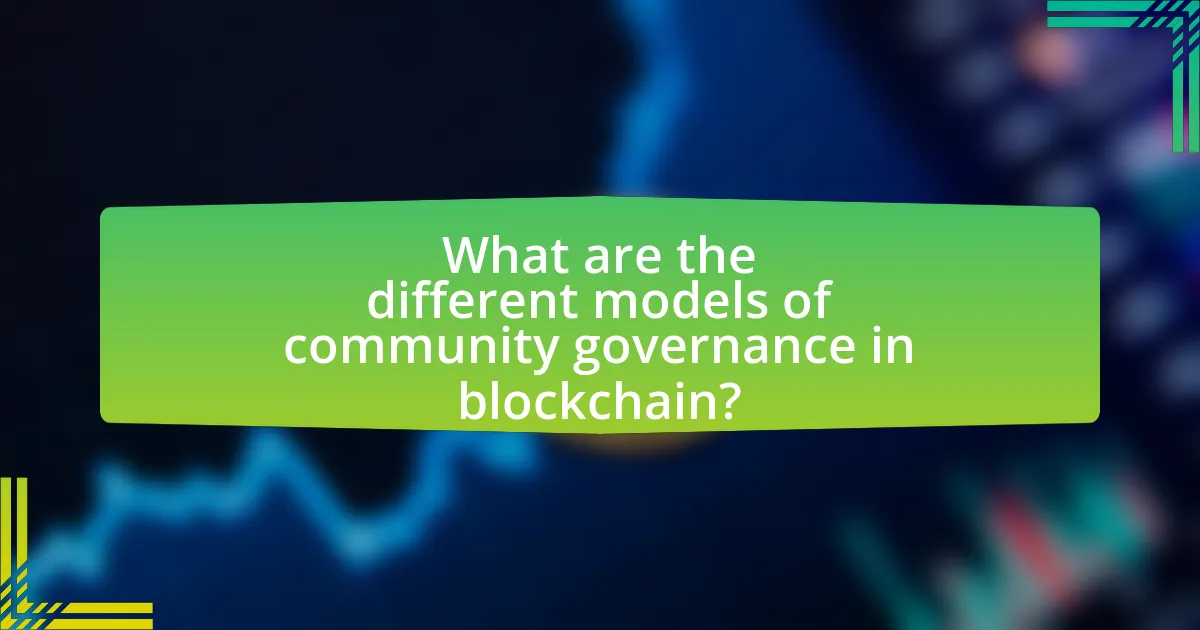
What are the different models of community governance in blockchain?
The different models of community governance in blockchain include on-chain governance, off-chain governance, and hybrid governance. On-chain governance allows stakeholders to vote directly on protocol changes through smart contracts, exemplified by projects like Tezos and Decred, where governance decisions are recorded on the blockchain. Off-chain governance involves discussions and decisions made outside the blockchain, often through forums or social media, as seen in Bitcoin’s governance model, where community consensus is reached through informal channels. Hybrid governance combines both on-chain and off-chain elements, allowing for flexibility and broader participation, as demonstrated by projects like Ethereum, which utilizes off-chain discussions for proposals while implementing on-chain voting for final decisions. These models reflect the diverse approaches to community involvement and decision-making in blockchain ecosystems.
How do decentralized autonomous organizations (DAOs) operate?
Decentralized autonomous organizations (DAOs) operate through smart contracts on blockchain networks, enabling collective decision-making without centralized control. Members of a DAO typically hold governance tokens that grant them voting rights on proposals, allowing them to influence the organization’s direction and policies. For instance, the Ethereum-based DAO, known as The DAO, raised over $150 million in 2016, demonstrating the potential for community-driven funding and governance. DAOs utilize transparency and immutability of blockchain technology to ensure that all transactions and decisions are recorded and verifiable, fostering trust among participants.
What are the advantages and challenges of DAOs in community governance?
Decentralized Autonomous Organizations (DAOs) offer significant advantages and challenges in community governance. One advantage is enhanced transparency, as all transactions and decisions are recorded on the blockchain, allowing community members to verify actions easily. This transparency fosters trust among participants, which is crucial for effective governance. Additionally, DAOs enable greater inclusivity by allowing anyone with internet access to participate in decision-making processes, thus democratizing governance.
However, DAOs also face challenges, such as the potential for governance attacks, where malicious actors exploit vulnerabilities in the voting mechanisms to influence outcomes. Furthermore, the complexity of smart contracts can lead to unintended consequences if not properly audited, resulting in financial losses or governance failures. These challenges highlight the need for robust security measures and clear governance frameworks to ensure the effectiveness of DAOs in community governance.
How do DAOs facilitate decision-making among community members?
DAOs facilitate decision-making among community members by enabling a decentralized governance structure where all members can propose, discuss, and vote on initiatives. This participatory model empowers individuals to have a direct influence on decisions affecting the community, ensuring that diverse perspectives are considered. For instance, through smart contracts, DAOs automate the voting process, allowing for transparent and tamper-proof outcomes. Research indicates that this approach enhances engagement and accountability, as members are more likely to participate when they have a stake in the decision-making process.
What role do tokenomics play in community governance?
Tokenomics play a crucial role in community governance by providing the economic incentives and mechanisms that facilitate participation and decision-making within a blockchain ecosystem. Specifically, tokenomics defines how tokens are distributed, utilized, and valued, which directly influences community engagement and governance structures. For instance, projects like Ethereum utilize tokenomics to empower holders with voting rights proportional to their token ownership, thereby aligning economic interests with governance participation. This model has been validated by the success of decentralized autonomous organizations (DAOs), where token holders actively vote on proposals, demonstrating that effective tokenomics can enhance community involvement and ensure that governance reflects the collective interests of its members.
How do tokens influence voting power and governance participation?
Tokens directly influence voting power and governance participation by serving as a mechanism for stakeholders to express their preferences and make decisions within a blockchain ecosystem. In many decentralized governance models, the number of tokens held by an individual correlates with their voting weight, meaning that those with more tokens have greater influence over governance decisions. For example, in platforms like Ethereum’s governance proposals, token holders can vote on protocol changes, with each token representing a vote. This structure incentivizes participation, as stakeholders are motivated to engage in governance to protect their investments and influence the direction of the project. Additionally, research indicates that token-based voting systems can lead to more democratic governance, as they allow a broader range of participants to contribute to decision-making processes, thereby enhancing community involvement and accountability.
What are the implications of token distribution on governance effectiveness?
Token distribution significantly impacts governance effectiveness by influencing stakeholder participation and decision-making power. A well-balanced token distribution fosters a diverse and engaged community, which enhances the legitimacy and responsiveness of governance processes. For instance, research indicates that projects with equitable token distribution tend to have higher voter turnout and more representative decision-making outcomes, as seen in the governance models of successful decentralized autonomous organizations (DAOs) like MakerDAO. Conversely, concentrated token ownership can lead to centralization of power, where a few holders dominate governance decisions, undermining the principles of decentralization and community involvement. This dynamic illustrates that the structure of token distribution is crucial for achieving effective governance in blockchain projects.
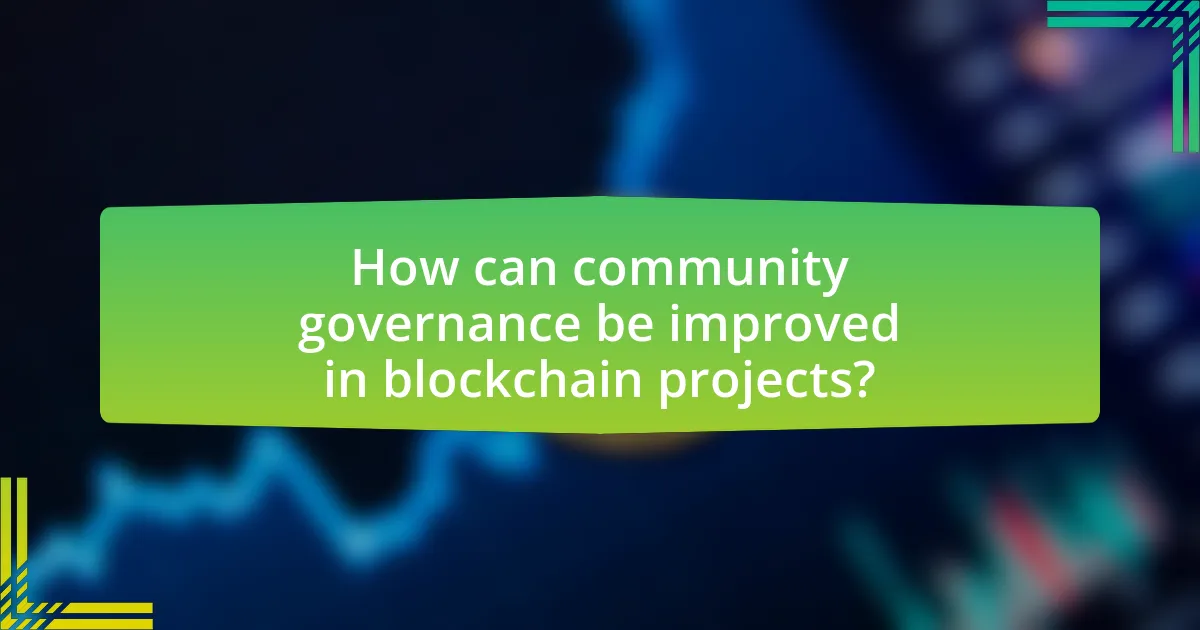
How can community governance be improved in blockchain projects?
Community governance in blockchain projects can be improved by implementing transparent decision-making processes and enhancing stakeholder engagement. Transparent decision-making allows community members to understand how decisions are made, fostering trust and accountability. For instance, utilizing decentralized autonomous organizations (DAOs) can facilitate this transparency by allowing token holders to vote on proposals directly, as seen in projects like MakerDAO, where governance tokens empower users to influence project direction. Enhancing stakeholder engagement can be achieved through regular communication, feedback mechanisms, and educational initiatives that inform community members about governance processes and their roles. Research indicates that projects with active community participation, such as Ethereum, tend to have more robust governance structures, leading to better project outcomes.
What best practices can enhance community participation in governance?
Best practices that can enhance community participation in governance include fostering transparency, encouraging open communication, and implementing inclusive decision-making processes. Transparency builds trust, as evidenced by studies showing that communities with clear information about governance processes experience higher engagement levels. Open communication channels, such as forums and social media, allow for diverse voices to be heard, which is crucial in blockchain projects where stakeholder input can significantly influence outcomes. Inclusive decision-making processes, such as voting mechanisms and consensus-building activities, empower community members and ensure that governance reflects the collective interests of the community. These practices collectively create an environment where community members feel valued and motivated to participate actively in governance.
How can transparency and communication be fostered in governance processes?
Transparency and communication in governance processes can be fostered through the implementation of decentralized decision-making frameworks and open information sharing. Decentralized governance models, such as those used in blockchain projects, allow stakeholders to participate in decision-making, ensuring that diverse perspectives are considered. Open information sharing, facilitated by blockchain technology, provides real-time access to data and decisions, enhancing accountability. For instance, projects like Ethereum utilize transparent smart contracts that allow all participants to verify transactions and governance decisions, thereby building trust within the community. This combination of decentralized participation and accessible information creates a governance environment that prioritizes transparency and effective communication.
What tools and platforms support effective community governance?
Effective community governance is supported by tools and platforms such as Aragon, DAOstack, and Colony. Aragon provides a framework for creating and managing decentralized organizations, enabling transparent decision-making and governance through smart contracts. DAOstack facilitates decentralized governance by allowing communities to create and manage their own DAOs (Decentralized Autonomous Organizations) with a focus on collective decision-making. Colony offers a platform for managing decentralized teams and projects, emphasizing reputation-based governance and incentivizing contributions. These platforms enhance community engagement and ensure that governance processes are efficient and transparent, which is crucial for the success of blockchain projects.
What are common challenges faced in community governance?
Common challenges faced in community governance include lack of participation, decision-making conflicts, and transparency issues. Lack of participation often results from community members feeling disconnected or undervalued, leading to low engagement in governance processes. Decision-making conflicts arise when diverse opinions clash, making it difficult to reach consensus on important issues. Transparency issues can undermine trust, as community members may feel uninformed about governance decisions or processes. According to a study by the World Economic Forum, effective community governance requires addressing these challenges to foster collaboration and trust among participants in blockchain projects.
How can conflicts within the community be resolved effectively?
Conflicts within the community can be resolved effectively through structured dialogue and mediation processes. Implementing a clear framework for communication allows community members to express their concerns and perspectives openly. Mediation by neutral parties can facilitate understanding and help find common ground, which is essential in blockchain projects where diverse opinions often exist. Research shows that communities with established conflict resolution mechanisms, such as regular forums or voting systems, experience lower levels of discord and higher satisfaction among members. For instance, a study by the Harvard Negotiation Project highlights that structured negotiation processes can lead to more sustainable resolutions in community settings.
What strategies can mitigate the risks of governance centralization?
Decentralization of governance can be mitigated through strategies such as implementing multi-signature wallets, establishing decentralized autonomous organizations (DAOs), and promoting community voting mechanisms. Multi-signature wallets require multiple parties to authorize transactions, reducing the risk of unilateral decision-making. DAOs enable collective decision-making by allowing stakeholders to vote on proposals, ensuring that governance is distributed among a wider group. Community voting mechanisms empower users to participate in governance decisions, fostering transparency and accountability. These strategies have been shown to enhance participation and reduce the concentration of power, as evidenced by successful blockchain projects like Ethereum and MakerDAO, which utilize these methods to maintain decentralized governance structures.
What practical steps can blockchain projects take to implement effective community governance?
Blockchain projects can implement effective community governance by establishing clear governance frameworks that define roles, responsibilities, and decision-making processes. These frameworks should include mechanisms for community participation, such as voting systems or consensus protocols, which empower stakeholders to influence project direction. For instance, projects like Ethereum utilize decentralized autonomous organizations (DAOs) to facilitate community-driven decision-making, allowing token holders to vote on proposals. Additionally, regular communication channels, such as forums or social media groups, can enhance transparency and foster community engagement, ensuring that all voices are heard. Research indicates that projects with active community involvement tend to have higher levels of trust and commitment, which are crucial for long-term sustainability.
